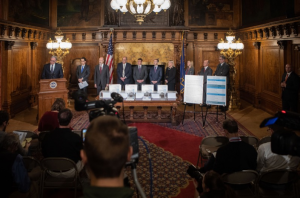
Officials hold a press conference on the pension last week in Harrisburg.
Credit: PA Internet News Service
The big numbers related to Pennsylvania’s public pension debt are somewhat mind-boggling. According to a September report from Truth in Accounting, a nonprofit organization that aims to find out what states’ balance sheets truly look like, the commonwealth has $42.8 billion in unfunded pension obligations and another $29.8 billion in underfunded retiree health care benefits.
For the sake of comparison, the state’s annual budget for the 2018-19 fiscal year is $32.7 billion – which means if the state devoted every penny it takes in to nothing but closing that gap, it would still take more than two years to do it.
Even in the aftermath of 2017, reforms that were designed to at least keep the pension problem from getting worse, many lawmakers have argued that continuing to live with this looming obligation has kept the state from attending to other priorities like education and the opioid crisis and forced taxes to be higher than they otherwise would be.
The 2017 legislation also provided for a commission to come up with fresh ideas for chipping away at the pension debt, and that commission recently released its report. Tasked with eliminating $3 billion in debt over the course of 30 years, members of the Public Pension Management and Asset Investment Review Commission, in a news conference late last week, reported that their recommendations would in fact save as much as $10 billion over that time frame.
One of the key proposals was simply that the Legislature make its obligated annual payments to the pension funds.
“As the report details, as numerous witnesses detailed, there was a long period in which the state failed to live up to that obligation,” Pennsylvania Treasurer Joe Torsella, the commission’s vice chairman, said during the news conference. “It is commendable that this governor and this Legislature have for the past three years – and I haven’t seen the budget address he’s giving in a few weeks, but hopefully for four – have fully funded the actuarially required contribution of funds. That is a hopeful new chapter in our history here, but it is vital – it is vital – that that chapter continue in the years ahead.”
Gov. Tom Wolf followed up Torsella’s comments by declaring that his budget proposal for the 2019-20 fiscal year, which will be released on Feb. 5, will aim to make the required pension payments.
“That unfunded pension liability … in many ways is a residue of the of the past, of bipartisan administrations and General Assemblies deciding not to pay the full bill,” Wolf said. “We are paying the full bill now. That was one of the recommendations of the commission, and I will, Treasurer Torsella, will commit to at least proposing that we continue to do that as we move forward.”
Another element of the commission’s report is the establishment of a Consolidated Central Pension Investment Office. This entity would be responsible for monitoring how pension funds are managed in the wake of revelations that in many years the management fees for the pensions have exceeded the contributions of state workers.
Given that the proposed office and some of the other recommendations require legislative action to implement, the commission members were asked how much impact the report can have if lawmakers don’t follow up.
“My colleagues [in the Legislature]” have been paying close attention to the work that the pension commission” has been doing, said Rep. Mike Tobash, R-Schuylkill Haven, the chairman of the commission. “As a matter of fact … in the Senate, I believe a co-sponsor memo has already been circulated discussing the fact that consolidation is an important element and a recommendation of the report.”
Torsella emphasized that regardless of lawmakers actions, there are many areas that can go into effect more or less immediately, such as tying the investment of funds to stock market indexes and improving the transparency of the boards that manage the funds.
“I don’t think any of these themes will startle people,” he said. “And I’m hopeful that for the few that require legislation, that will happen.”








